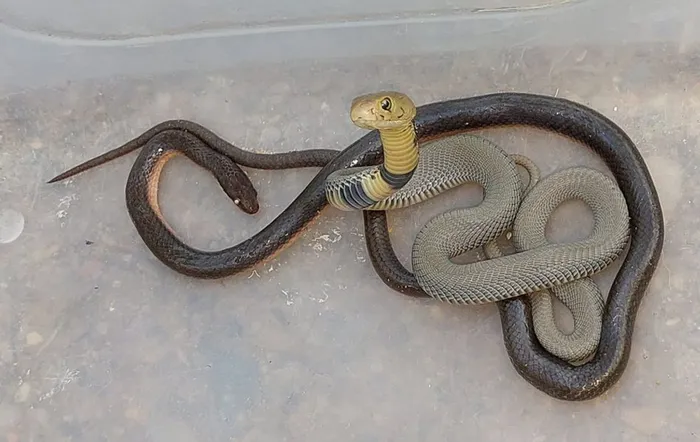Snake catcher called out to help with 5 Mozambique Spitting Cobras in Durban

The cobra that had tried to eat a brown water snake. Picture: Supplied
Durban - Snake catcher Nick Evans said that last Friday was a day for Mozambique spitting cobras - he received five calls relating to them that day.
Evans said on Friday afternoon he went to the Paradise Valley area for a baby cobra.
“When I arrived, I found a resident had already scooped it up into a box, and luckily, the snake had its mouthful. A mouthful of snake!”
Evans said the cobra hatchling of a few weeks, “had taken on a beautiful brown water snake. Not a large one, although I'd consider it an adult. They were a non-venomous, extremely docile species but cobras are not quite like that, especially when they smell food”.
“The cobra was clearly trying to regurgitate its meal but was stuck where the snake was folded. It was apparently like that when it was initially caught. It tried and tried, and wasn't winning, so I assisted it a little, by just pressing down on the brown water snake with my hook. The cobra soon managed,” Evans said.
He said the brown water snake was around 8cms longer than the cobra.
Evans recalled that last season he was called to help with a spotted bush snake being eaten by a juvenile cobra. It was much larger than the cobra.
He said the cobras needed to learn what they can actually eat.
“Now, where are my beloved black mambas?” asked Evans.
https://youtu.be/OkLT8uxvJQM
Meanwhile, Evans recently made a video of a recent clutch of Mozambique spitting cobras going free.
Evans said he had captured the mother a few months ago, who was visibly gravid (pregnant). He let her lay her eggs in captivity then he set her free. In the wild it would work the same way, she would lay her eggs and leave them.
He said they hatched last Thursday and it was time to release them.
“These youngsters don't stay together for safety in numbers. They disperse immediately. The majority will get eaten by natural predators, such as mongoose, monitor lizards, birds etc. At this size, they'll feed mostly on small toads. Fulfilling their role in the food chain,” Evans said.
Daily News
WATCH: Southern African python stuck in an electric fence rescued in Umhlali, north of Durban
Green mambas that hatched on Valentine’s Day have been released in KZN
Green mambas born on Valentine’s Day are ready for release
Snake catchers warn dog owners of the dangers of allowing them to roam around when a snake has been spotted
Related Topics: